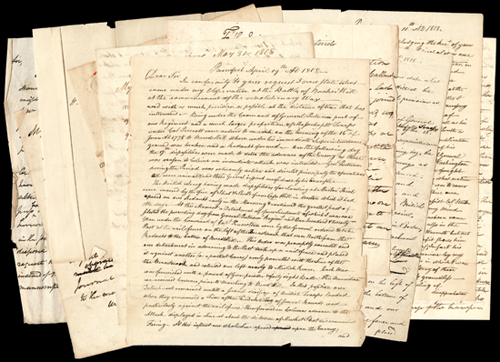
Auction: 313 - Numismatic Collector's Series - Ft. Worth, TX
Lot: 1426
American Revolution: [Israel Putnam at Bunker Hill] Important series of letters most concerning the "Dearborn Affair" of 1818, in which former Secretary of War, Gen Henry Dearborn questioned Putnam´s role as commander of Continental troops during the Battle of Bunker (Breed´s) Hill. Begins with a Revolutionary War-date Manuscript Letter written and signed on behalf of General Israel Putnam by his son, Col Daniel Putnam, Pomfret, [CT], January 14, 1780. He writes to Mrs Wadsworth that they have arrived after "a fatiguing march of four days." Though his leg and foot have improved, "my arm seems yet to be a useless member." Putnam had suffered a stroke a month earlier, hence his dependence on his son´s writing. This letter split into five pieces at folds, about Good. With choice content ALS by Judge Thomas Grosvenor of Pomfret, April to Daniel Putnam, son of the late General Israel Putnam, recounting the battle: "Being under the Comand of General Putnam, part of our Regiment...were ordered to march on the Evening of the 16th of January AD 1775 to Breed´s Hill, where under his immediate Superintendance ground was broken and a Redoubt formed...Genl Putnam...directed principally the operations...The British Army having made dispositions for Landing at Morton´ [sic] Point, were covered by the fire of Shot & Shell from Caps Hill in Boston which it had opened on our redoubt early in the Morning...A detachment of four Lieutenants of which I was one...and One hundred & twenty Men under the Command of Capt Knowlton were by the General ordered to take Post at the rail fence on the left of the Breastwork that ran North from the Redoubt to the bottom of Breed Hill...Our detachment...took up a rail fence and placed it against another...nearly parallel with the Line of te Breastwork and extended our left nearly to Mistick River. Each man was furnished with a pound of Gunpowder & forty eight Balls...A second division of British Troops landed when they commenced a Fire of their Field Artillery...against the rail fence. Then formed in Columns advance to the Attack displayed in linea bout the distance of Musket Shot and commenced firing...Our whole Line opened upon the Enemy; and so precise and fatal was our fire athat in the course of a short time they gave way." A second charge was repulsed, but after being reinforced, the British forced the detachment to retreat with heavy casualties; Grosvenor heard later that troops ordered to his aid would not go. "On the Ground the most active within my Observation were General Putnam, Col Prescott and Capt Knowlton." He assures Daniel Putnam that he is shocked to have to defend someone whose military character was so evident to all who knew him. With a second copy of the same letter [in another hand] that was enclosed to Nathaniel Terry, with covering letter that calls Dearborn´s claims "as devoid of Truth as they are of honorable Sentiment." Those claims included one - still repeated in history books today - that Dearborn was positioned in the very place that Grosvenor says his men stood. With an interesting Memorandum, unsigned, concerning the battle, and General Putnam´s actions toward Major John Small. Days after the battle, Major Small sent a hamper of wine to General Putnam with gratitude for his kindness. Putnam admitted that he and Small had been as close as brothers (they had fought together in the French and Indian War), and at the redoubt, when the enemy was once repulsed, " ´The first object I saw was Small alone. He was not more than ten or 12 yards distance and was just turning to descend the hill...A man standing next to me drew up his piece to level at him....Seizing him by the shoulder,I called aloud, "Spare that man...he is my friend...Two or three others...were stopped by my voice...´" Small then sent another note inviting Putnam to leave the American service, and that he and his sons could "make his own terms...The offers were spurned, & Washington was made acquainted with all the particulars. He said, the times were jealous, & it would be better not to say anything of it." With two ALS by Daniel Putnam to Col. John Trumbull on Dearborn´s claims, another ALS from Daniel´s uncle Sam Putnam, who names survivors from the battle who can support the late general´s reputation in the fight, with Daniel´s reply. Several letters and sworn statements were published in defense of Israel Putnam, including that of Grosvenor and of the patriots interviewed by Sam Putnam, and have appeared in the appendix of Increase Tarbox´s Life of General Putnam, published in 1876. With an additional ALS by Daniel Putnam, Brooklyn, NY, July 1818, his retained copy of a letter to "the Editor of the Centinel," clearing up a misunderstanding that had arisen after he wrote to former President John Adams about the command structure of the Continental Army at the time of Bunker Hill. With one other letter offering moral support, and an ALS by Daniel Putnam about his pension; finally, with a later family letter. One letter with small hole affecting two words, all with some fold or edge wear as usual for their age, but in every case VG. [14]
Sold for
$5,500




